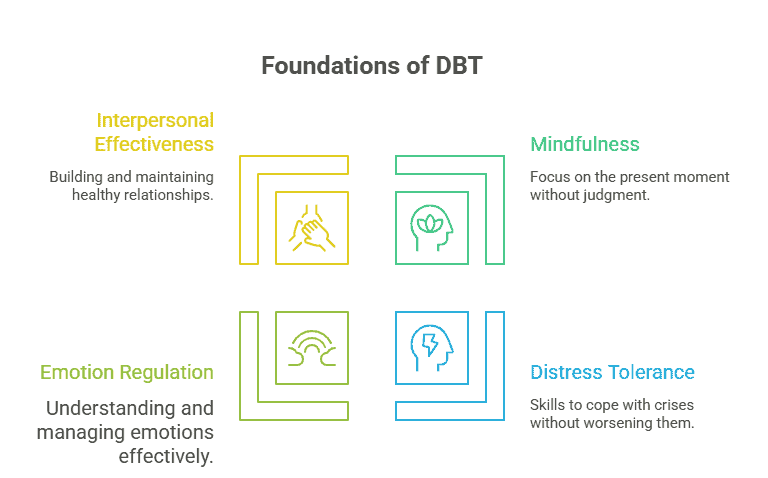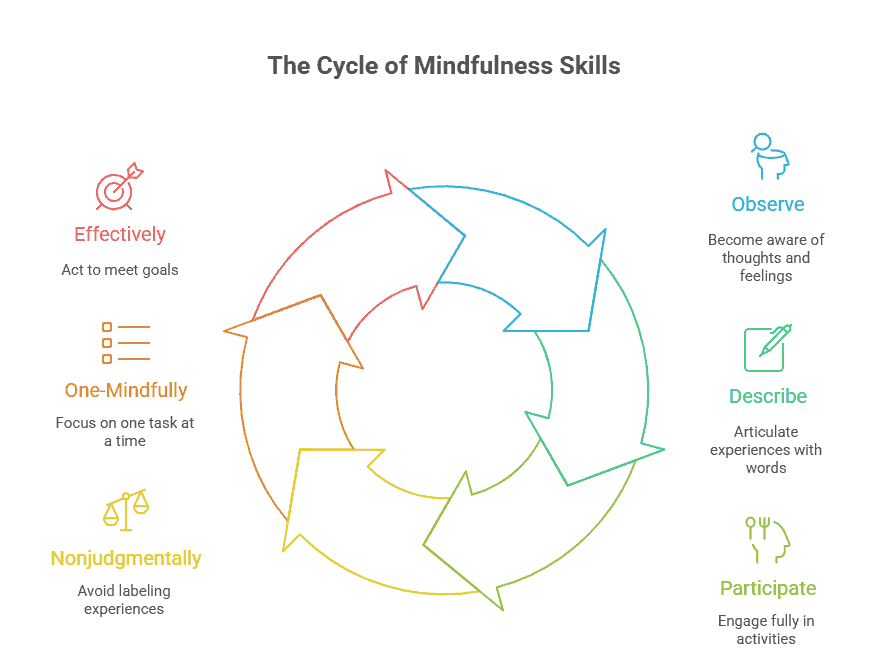If you have ever wondered what are the four modules of DBT are, then the shorter explanation is as follows: Mindfulness, Distress Tolerance, Emotion Regulation, and Interpersonal Effectiveness. These four sets of skills, when combined, provide people with practical skills to regulate emotions, withstand crises, maintain relationships, and be present in the moment. Think of it as a life skills kit-a kit that helps you stop reacting on autopilot and begin responding in a balanced manner with purpose.

DBT in Everyday Language: What It Actually Means
Dialectical Behaviour Therapy, or DBT, is an aspect of working with people that teaches concrete skills on how to deal with the storms in their lives. “Dialectics” may sound like a word too technical for a philosophy book; altogether, it means just that two contradictory things may actually hold at the same time: “I am doing my best” and “I could still do with some improvement.”
This balance of acceptance and change is the backbone of DBT. The therapy doesn’t just talk about problems—it hands you tools to do something about them. And unlike advice you might get from a well-meaning friend (“just calm down” or “don’t think about it”), DBT gives you structured, evidence-based skills that actually work.
The Core Framework: Acceptance vs. Change
Before we look closely at each module, here’s the big picture. The four DBT modules fall into two categories:
- Acceptance Skills: Mindfulness and Distress Tolerance
- Change Skills: Emotion Regulation and Interpersonal Effectiveness
Acceptance helps you cope with reality as it is. Change helps you shift what can be improved. Together, they create balance.
Module 1: Mindfulness – The Foundation of DBT
Mindfulness in DBT isn’t about sitting on a mountain chanting “om.” It’s about paying attention to the present moment without judgment. This is the skill that supports all the others, because if you can’t notice what’s happening, you can’t manage it.
The “What” Skills
- Observe: Becoming aware as a thought, feeling, or sensation arises.
- Describe: Attach words to your experience (“I feel tense in my shoulders”).
- Participate: Completely engage in whatever is occurring: active participation in cooking, praying, or walking.
- Nonjudgmentally: Stop classifying anything as “good” or “bad.”
- One-Mindfully: Only one task at a time instead of juggling three.
- Effectively: Do what works to meet your goals, even if it does not feel good at the moment.
Fast practice: Next time you sit down to sip your cup of tea, simply act the one-mindedness. The warmth in your hand, the taste on your tongue, and the steam rising have to be experienced in the moment. Less than a minute, but extremely powerful.
Module 2: Distress Tolerance – Surviving the Storm
There are times when life throws obstacles at you that cannot be immediately rectified: be it grief, conflict, or sudden anxiety. Distress Tolerance tells you how to get through a crisis without letting it get worse.
Skills You’ll Learn
- Crisis Survival Toolbox: STOP (Stop, take a step back, Observe, and Proceed mindfully); Pros and Cons; and TIPP (temperature, intense exercise, paced breathing, progressive relaxation).
- Accepting Reality: Radical Acceptance and Turning the Mind. Acceptance in this sense entails learning to accept situations over which one may have no control, whether or not one actually approves of them.
Quick Practice: When anger surges, try holding an ice cube. It shifts your body’s response, buys you time, and is far better than sending that regrettable text.

Module 3: Emotion Regulation – Understanding and Managing Feelings
This module helps you identify your feelings, name them, and respond adequately. Instead of controlling you, emotions should work with you.
Core Techniques
- Check the Facts: Does this powerful emotion really fit what’s going on?
- Opposite Action: If feeling sad puts you in the mood to self-isolate, consider doing the opposite; call a friend or just go outside for a walk.
- ABC PLEASE: Accumulate positive experiences, Build mastery, Cope ahead, Eat and get some sleep, and avoid substance abuse.
Quick Tip: Keep a small mastery list. Each day a single achievement is done to fortify competence: preparing a dish, finishing a chore, or solving a puzzle. Mastery creates resilience.
Module 4: Interpersonal Effectiveness – People Skills Without Losing Yourself
Relationships can be hard. Well, Module 12 will teach you skills for clear communication with others, the maintenance of boundaries, and keeping some sort of respect for yourself.
Key Tools
- DEAR MAN: Helps you ask for what you want effectively.
- GIVE: Keeps relationships healthy (Gentle, Interested, Validate, Easy manner).
- FAST: Protects your self-respect (Fair, limit Apologies, Stick to values, Truthful).
Quick Practice: Next time you need to decline an invitation, try: “Thanks for thinking of me, but I won’t be able to make it.” Clear, kind, and boundary-respecting—no long excuses needed.
A Week of DBT in Real Life
To see how it all connects, here’s a simple weekly routine:
- Monday: Practice mindfulness while making breakfast.
- Tuesday: Use Check the Facts when you feel anxious before a meeting.
- Wednesday: Apply DEAR MAN to ask for support at work or home.
- Thursday: Use TIPP if you feel overwhelmed in traffic.
- Friday: List three positives that happened this week to accumulate good emotions.
Over time, these skills stack up, helping you respond rather than react.
Therapy and DBT: Why Guidance Helps
While self-help tools are useful, many people find that DBT skills “stick” better with guidance. A therapist can:
- Personalise which skills to prioritise.
- Coach you through challenges and setbacks.
- Provide accountability and encouragement when motivation dips.
And here’s where therapy differs from reading a list of skills online—it turns knowledge into habit.
What This Means for You
So, if you were ever wondering what the four modules really feature, now you have your answer: they offer skills to teach mindfulness, emotional management, stress, and positive relationship development. These skills weld families and couples together, which happens to be essential, especially when the stress involved in parenting, difficulties in communicating, and buffering of emotional contrasts on one side and the other begin to test the alliance.
This is where Islamic couples therapy can be especially supportive. Blending DBT with faith-based guidance allows couples to learn mindful communication, healthy boundaries, and how to regulate emotions together. Our approach at Inner Peace Therapies is to teach couples to be resilient together in building relationships that support one another and the entire family.





